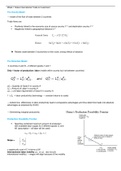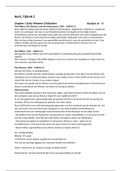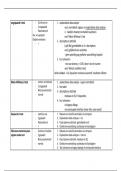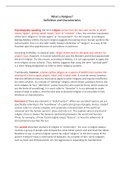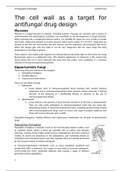Public Speaking Handbook
Chapter 1: Introduction to public speaking
What is public speaking?
● The process of presenting a spoken message to an audience, small or large.
● It builds upon the same communication process that we use in everyday situations
○ But it requires you to sharpen and use new skills
● Differences between communication and public speaking involve
○ It requires more preparation than conversation
○ It is more formal than conversation
○ It involves more clearly defined roles for the speaker and audience
● Studying public speaking can empower you
○ By know what tools to use correctly when expressing yourself, you’ll feel more
confident
○ By enhancing your public speaking skills it will make seem other people as less
educated and skilled, therefore positioning you for greater things
○ You develop critical thinking skills, which helps you listen and analyze information to
judge its relevance and accuracy
● Studying public speaking can help you gain employment
○ If you can speak well, you possess a skill that is valued highly
○ If you wish to become a high raking employee, you should learn how to communicate
effectively and deliver messages to the rest of the employees
● The history of public speaking
○ The Golden Age of Public Speaking (4th Century)
■ Aristotle formulated guidelines for public speaking that we still follow today
■ Roman orators continued Greek rhetorical tradition
● Quintilian: “a good person speaking well”
● Roman: orators invented the necktie, because of fear of getting
laryngitis
○ Nineteenth-Twentieth-Century Age of Political Oratory
■ Nineteenth-century audiences listened to speakers like Henry Clay, Daniel
Webster, Frederick Douglass, and Lucretia Mott on issues like states' rights,
abolition, and women's suffrage. Mark Twain also entertained with lectures.
■ Public speaking students focused on declamation, delivering famous
speeches by figures like Patrick Henry and William Jennings Bryan.
■ Elocution, the art of expressive speech delivery, was widely studied, with
manuals common in schools and homes.
○ Technological Age of Public Speaking
■ The first half of the century was greatly dented by the radio, since it let the
people hear lots of news and speeches, such as Franklin Delano Roosevelt’
decry on December 7th, 1941
■ After the radio, television became the freshest medium for news, through
which they heard and saw speeches such as Martin Luther King Jr.’s dream of
equality
● It is recommended that you keep your audience in mind at all times, for when your mind gets
clouded, so that it is easier to find a way out
,● The communication process
○ Linear communication
■Source: a public speaker is a source, which encodes, or translates, the ideas
into verbal or nonverbal symbols that the audience can recognize.
■ Message: it is the speech itself - how and what it’s said, if it is not transmitted
correctly, listeners may not be able to decode the speaker's verbal or
nonverbal symbols into a message
■ Channels: there are usually two channels, visual and auditory
■ Receiver: individual audience that has to decode the message, it will depend
on his or her particular experiences
■ Noise: anything that interferes with the communication of the message
● External: any factor that comes from the surrounding that may affect
the reception of the message
● Semantic: misinterpretations caused by the poor ability of message
delivery by the source
● Internal: any physiological or psychological factors
○ Communication as an interaction
■Feedback: it is any sort of signal the public speaker receives from the
audience listening to his speech, either nods, words or other sorts of
expression that they take into consideration for the rest of the speech
■ Context: the environment or the situation in which the speech occurs
○ Communication as a transaction
, ■ Both individuals involved in the communication are sending and receiving
messages at the same time
■ A good speaker should be able to, during his speech, receive and process the
message the audience is delivering while listening to his speech
Chapter 2: Speaking with confidence
Understand Your Nervousness
● Researchers have found that public speaking anxiety is both a trait (characteristic or general
tendency) and a state (triggered by a specific incidence of giving a speech to an audience)
○ People fear what the audience may think of them and about making public mistakes
○ Also, anxiety is the response of concern about not being prepared, worry about looks,
pressure to perform, personality insecurity, concern about lack of interest, lack of
experience, fear of making mistakes, and overall failure.
○ Men are more likely to experience anxiety than women when speaking to people from
a different culture
○ Perfectionism also increases anxiety
Your Biology Affects Your Psychology
● Anxiety may have a genetic or biological charge, genetic tendency to feel anxious
○ To control that, focus on behaviors you can change, like enhancing your speaking
skills
Your Psychology Also Affects Your Biology
● Your view of the speaking assignment, your perception of your speaking skill and your
self-esteem interact to create anxiety
○ Your brain signals this “dangerous” environment to your body, and you start reacting
“fight or flight”
○ Your body responds by summoning more energy to deal with the conflict (body
sweat, shakes, heart rate increases”
○ Physical discomfort leads to less eye contact, use of more voice pauses, rapid
speaking
Your Apprehension Follows a Predictable Pattern
● There are typical times when people feel nervous, most of them feel nervous before giving the
speech
How to Make Your Understanding of Anxiety Work for You
● Understand and consider the following observations
○ You feel more nervous than you look
○ You are not alone
○ You can use your anxiety - extra adrenaline, increased endorphins, give you a higher
energy level, which you can turn into enthusiasm or excitement
, How to Build Your Confidence
● Know your audience
○ Learn the most you can about your audience before you present to them, study and
visualize their reactions, and you will feel like you already know them
● Don’t procrastinate
○ The lack of thorough preparation often results in a poor speech performance
○ Take charge and tackle the speech assignment early; give yourself every chance to be
successful, prepare early
● Select an appropriate topic
○ If you talk about something that is familiar to you, you’ll feel less nervous
● Prepare
○ The better prepared you are, the less anxiety you will experience
■ Research your topic, and practice your speech several times before the actual
presentation
■ Transitional phrases and summaries can help you present a well-structured,
easy to understand message
● Be organized
○ Speeches should follow a logical outline pattern and have a clear beginning, middle
and end
■ Speakers can better manage their apprehension if they rely on the rules and
structures of a speaking assignment, following a clear outline pattern
● Know your introduction and conclusion
○ You are more likely to feel anxious at the opening of the speech, have it well in mind
○ By knowing the end of your speech, if you have to end it earlier it will permit you to
make a graceful exit
● Make practice real
○ Pretend you are actually presenting the speech to an audience
● Breathe
○ Consider taking a few slow, deep breaths before you rise to speak, so that you don’t
lack air during the presentation (it makes it less obvious that you are nervous)
● Channel your nervous energy
○ Channel the energy you see reflected in sweat, shaking and other symptoms, by
walking, tensing and relaxing muscles, wiggling toes, think calm
● Visualize your success
○ Imagine a scene in which you exhibit skill and comfort as a public speaker, imagine
yourself giving the speech as a well-prepared professional speaker
● Give yourself a mental pep talk
○ Giving yourself a pep talk can boost your confidence and take your mind off of
nervousness
● Focus on your message, not on your fear
○ Think about what you are going to say, take a few moments to mentally review your
ideas, give less time to the act of reinforcing your anxiety
● Look for positive support
○ If you believe the audience is criticizing you, you’ll feel more anxious, when you are
aware of the support you receive, you feel more confident
■ Public speakers feel less nervous if they have a small community that gives
them positive feedback
Chapter 1: Introduction to public speaking
What is public speaking?
● The process of presenting a spoken message to an audience, small or large.
● It builds upon the same communication process that we use in everyday situations
○ But it requires you to sharpen and use new skills
● Differences between communication and public speaking involve
○ It requires more preparation than conversation
○ It is more formal than conversation
○ It involves more clearly defined roles for the speaker and audience
● Studying public speaking can empower you
○ By know what tools to use correctly when expressing yourself, you’ll feel more
confident
○ By enhancing your public speaking skills it will make seem other people as less
educated and skilled, therefore positioning you for greater things
○ You develop critical thinking skills, which helps you listen and analyze information to
judge its relevance and accuracy
● Studying public speaking can help you gain employment
○ If you can speak well, you possess a skill that is valued highly
○ If you wish to become a high raking employee, you should learn how to communicate
effectively and deliver messages to the rest of the employees
● The history of public speaking
○ The Golden Age of Public Speaking (4th Century)
■ Aristotle formulated guidelines for public speaking that we still follow today
■ Roman orators continued Greek rhetorical tradition
● Quintilian: “a good person speaking well”
● Roman: orators invented the necktie, because of fear of getting
laryngitis
○ Nineteenth-Twentieth-Century Age of Political Oratory
■ Nineteenth-century audiences listened to speakers like Henry Clay, Daniel
Webster, Frederick Douglass, and Lucretia Mott on issues like states' rights,
abolition, and women's suffrage. Mark Twain also entertained with lectures.
■ Public speaking students focused on declamation, delivering famous
speeches by figures like Patrick Henry and William Jennings Bryan.
■ Elocution, the art of expressive speech delivery, was widely studied, with
manuals common in schools and homes.
○ Technological Age of Public Speaking
■ The first half of the century was greatly dented by the radio, since it let the
people hear lots of news and speeches, such as Franklin Delano Roosevelt’
decry on December 7th, 1941
■ After the radio, television became the freshest medium for news, through
which they heard and saw speeches such as Martin Luther King Jr.’s dream of
equality
● It is recommended that you keep your audience in mind at all times, for when your mind gets
clouded, so that it is easier to find a way out
,● The communication process
○ Linear communication
■Source: a public speaker is a source, which encodes, or translates, the ideas
into verbal or nonverbal symbols that the audience can recognize.
■ Message: it is the speech itself - how and what it’s said, if it is not transmitted
correctly, listeners may not be able to decode the speaker's verbal or
nonverbal symbols into a message
■ Channels: there are usually two channels, visual and auditory
■ Receiver: individual audience that has to decode the message, it will depend
on his or her particular experiences
■ Noise: anything that interferes with the communication of the message
● External: any factor that comes from the surrounding that may affect
the reception of the message
● Semantic: misinterpretations caused by the poor ability of message
delivery by the source
● Internal: any physiological or psychological factors
○ Communication as an interaction
■Feedback: it is any sort of signal the public speaker receives from the
audience listening to his speech, either nods, words or other sorts of
expression that they take into consideration for the rest of the speech
■ Context: the environment or the situation in which the speech occurs
○ Communication as a transaction
, ■ Both individuals involved in the communication are sending and receiving
messages at the same time
■ A good speaker should be able to, during his speech, receive and process the
message the audience is delivering while listening to his speech
Chapter 2: Speaking with confidence
Understand Your Nervousness
● Researchers have found that public speaking anxiety is both a trait (characteristic or general
tendency) and a state (triggered by a specific incidence of giving a speech to an audience)
○ People fear what the audience may think of them and about making public mistakes
○ Also, anxiety is the response of concern about not being prepared, worry about looks,
pressure to perform, personality insecurity, concern about lack of interest, lack of
experience, fear of making mistakes, and overall failure.
○ Men are more likely to experience anxiety than women when speaking to people from
a different culture
○ Perfectionism also increases anxiety
Your Biology Affects Your Psychology
● Anxiety may have a genetic or biological charge, genetic tendency to feel anxious
○ To control that, focus on behaviors you can change, like enhancing your speaking
skills
Your Psychology Also Affects Your Biology
● Your view of the speaking assignment, your perception of your speaking skill and your
self-esteem interact to create anxiety
○ Your brain signals this “dangerous” environment to your body, and you start reacting
“fight or flight”
○ Your body responds by summoning more energy to deal with the conflict (body
sweat, shakes, heart rate increases”
○ Physical discomfort leads to less eye contact, use of more voice pauses, rapid
speaking
Your Apprehension Follows a Predictable Pattern
● There are typical times when people feel nervous, most of them feel nervous before giving the
speech
How to Make Your Understanding of Anxiety Work for You
● Understand and consider the following observations
○ You feel more nervous than you look
○ You are not alone
○ You can use your anxiety - extra adrenaline, increased endorphins, give you a higher
energy level, which you can turn into enthusiasm or excitement
, How to Build Your Confidence
● Know your audience
○ Learn the most you can about your audience before you present to them, study and
visualize their reactions, and you will feel like you already know them
● Don’t procrastinate
○ The lack of thorough preparation often results in a poor speech performance
○ Take charge and tackle the speech assignment early; give yourself every chance to be
successful, prepare early
● Select an appropriate topic
○ If you talk about something that is familiar to you, you’ll feel less nervous
● Prepare
○ The better prepared you are, the less anxiety you will experience
■ Research your topic, and practice your speech several times before the actual
presentation
■ Transitional phrases and summaries can help you present a well-structured,
easy to understand message
● Be organized
○ Speeches should follow a logical outline pattern and have a clear beginning, middle
and end
■ Speakers can better manage their apprehension if they rely on the rules and
structures of a speaking assignment, following a clear outline pattern
● Know your introduction and conclusion
○ You are more likely to feel anxious at the opening of the speech, have it well in mind
○ By knowing the end of your speech, if you have to end it earlier it will permit you to
make a graceful exit
● Make practice real
○ Pretend you are actually presenting the speech to an audience
● Breathe
○ Consider taking a few slow, deep breaths before you rise to speak, so that you don’t
lack air during the presentation (it makes it less obvious that you are nervous)
● Channel your nervous energy
○ Channel the energy you see reflected in sweat, shaking and other symptoms, by
walking, tensing and relaxing muscles, wiggling toes, think calm
● Visualize your success
○ Imagine a scene in which you exhibit skill and comfort as a public speaker, imagine
yourself giving the speech as a well-prepared professional speaker
● Give yourself a mental pep talk
○ Giving yourself a pep talk can boost your confidence and take your mind off of
nervousness
● Focus on your message, not on your fear
○ Think about what you are going to say, take a few moments to mentally review your
ideas, give less time to the act of reinforcing your anxiety
● Look for positive support
○ If you believe the audience is criticizing you, you’ll feel more anxious, when you are
aware of the support you receive, you feel more confident
■ Public speakers feel less nervous if they have a small community that gives
them positive feedback

